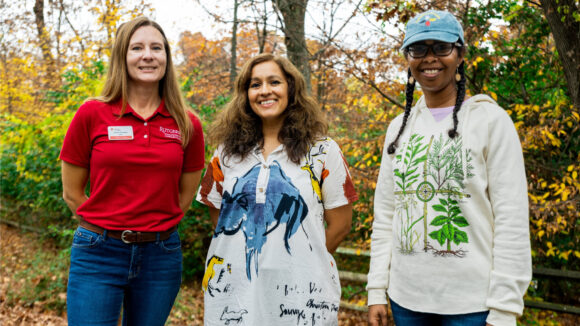
(l to r) Lauren Errickson, director of Rutgers Gardens and Campus Stewardship; Anita Bakshi, assistant professor of teaching; and Karelle Hall, a member of the Nanticoke Indian Tribe of Delaware and a Ph.D. student at Rutgers, during the native plant walk. Photo: Marques Ruiz/Rutgers University.
Project at Rutgers Gardens celebrates the continued presence of Indigenous communities in New Jersey
For generations, Native Americans’ relationships with their land have been systematically targeted through removal policies. Negative portrayals of Native American communities resulted in numerous environmental and cultural injustices, including the targeting of Native American land for waste disposal sites.
But a project at Rutgers Gardens seeks to bring attention to this wrongdoing and rectify some mistakes of the past. Rutgers faculty and the director of Rutgers Gardens are collaborating with Indigenous communities in New Jersey to explore how they might install more native plants of cultural significance.
Born out of a landscape architecture course taught by assistant professor of teaching Anita Bakshi, the Our Land, Our Stories project brings together the Department of Landscape Architecture and the Ramapough Lunaape Nation to focus on environmental justice advocacy and curriculum development for Native American history and contemporary Indigenous land relations.
In Spring 2022 their team received an IDEA Innovation Grant from Rutgers to explore ideas and possibilities for creating a garden on campus that will acknowledge Native American history and celebrate the continued presence of Indigenous communities in our state, including through the incorporation of plants significant to Native American communities for medicinal, ceremonial and agricultural uses.
The collaboration includes Holly Nelson, associate professor of professional practice in the School of Environmental and Biological Sciences; Jameson Sweet, an assistant professor of American studies in the School of Arts and Sciences and a member of the Lakota/Dakota nations; and Lauren Errickson, director of Rutgers Gardens and Campus Stewardship.
“In the era of climate change, Indigenous people have vital knowledge of North America’s ecosystems gleaned from many thousands of years living with and shaping the world around them. The garden project provides a starting point for Indigenous communities to share this much needed knowledge, but it is also a starting point for the Native American communities in New Jersey and the region to heal from centuries of violence, land theft and the attempted destruction of their cultures and ways of life by settlers. A return to Indigenous land stewardship can help combat climate change and rectify the dispossession of lands belonging to the sovereign tribal nations within the state,” said Sweet.
Community members were invited to a recent event at the gardens to learn about some of the indigenous plants already on the grounds and how the gardens seek to expand their offerings. Led by Errickson and Karelle Hall, a member of the Nanticoke Indian Tribe of Delaware and a Ph.D. student at Rutgers, visitors were taught native names from the Lenape Unami dialect and uses of plants, as well as ways to tell the differences between them.
“We’d like to not only acknowledge, but really better connect with, the Indigenous communities who have a deep relationship with this land and the native plants that grow here. We hope that we can help foster meaningful collaborations between the university and Indigenous communities through projects like this at Rutgers Gardens,” said Errickson.
Click here to read the rest of the article on Rutgers Today, which lists some of the native plants currently at Rutgers Gardens.

